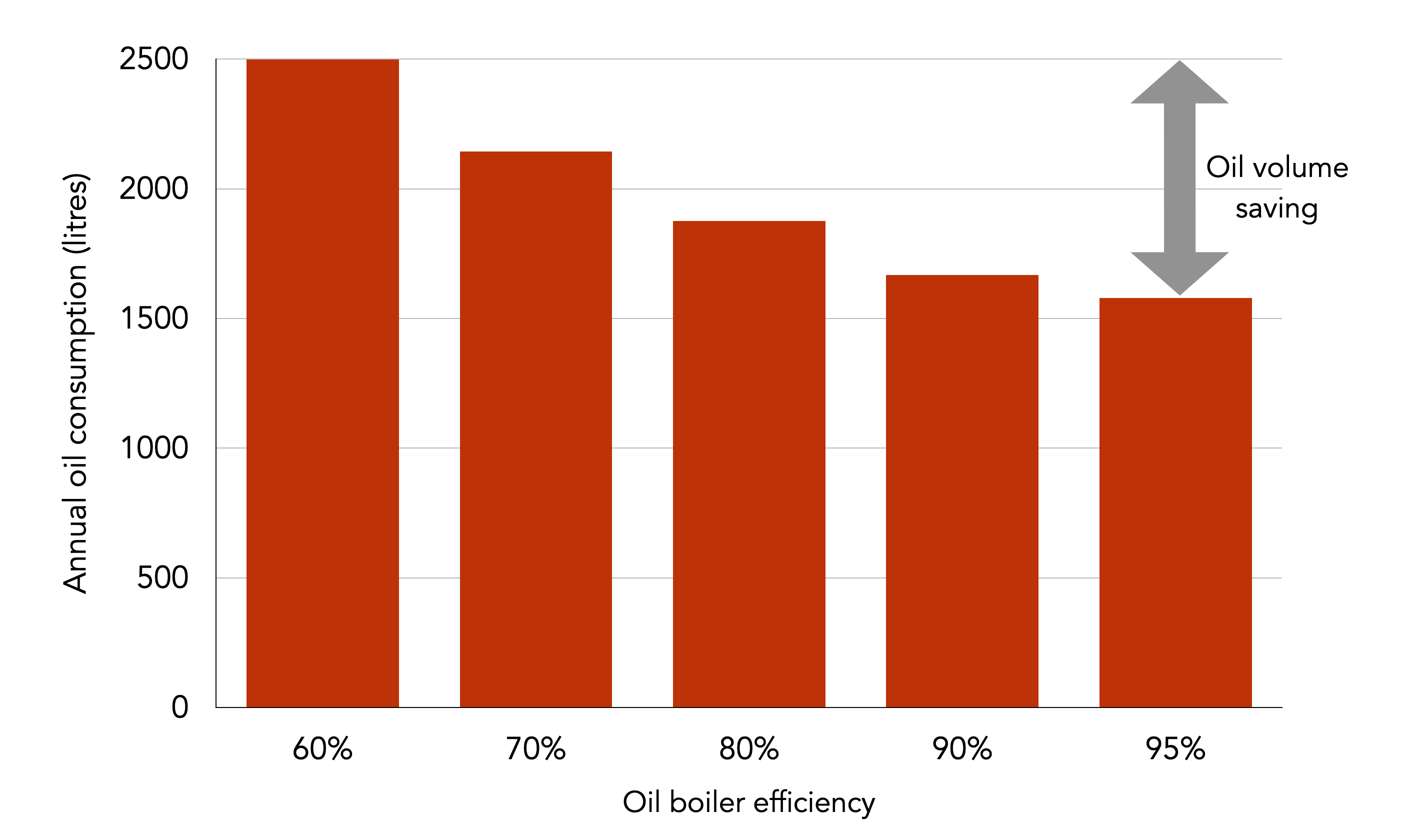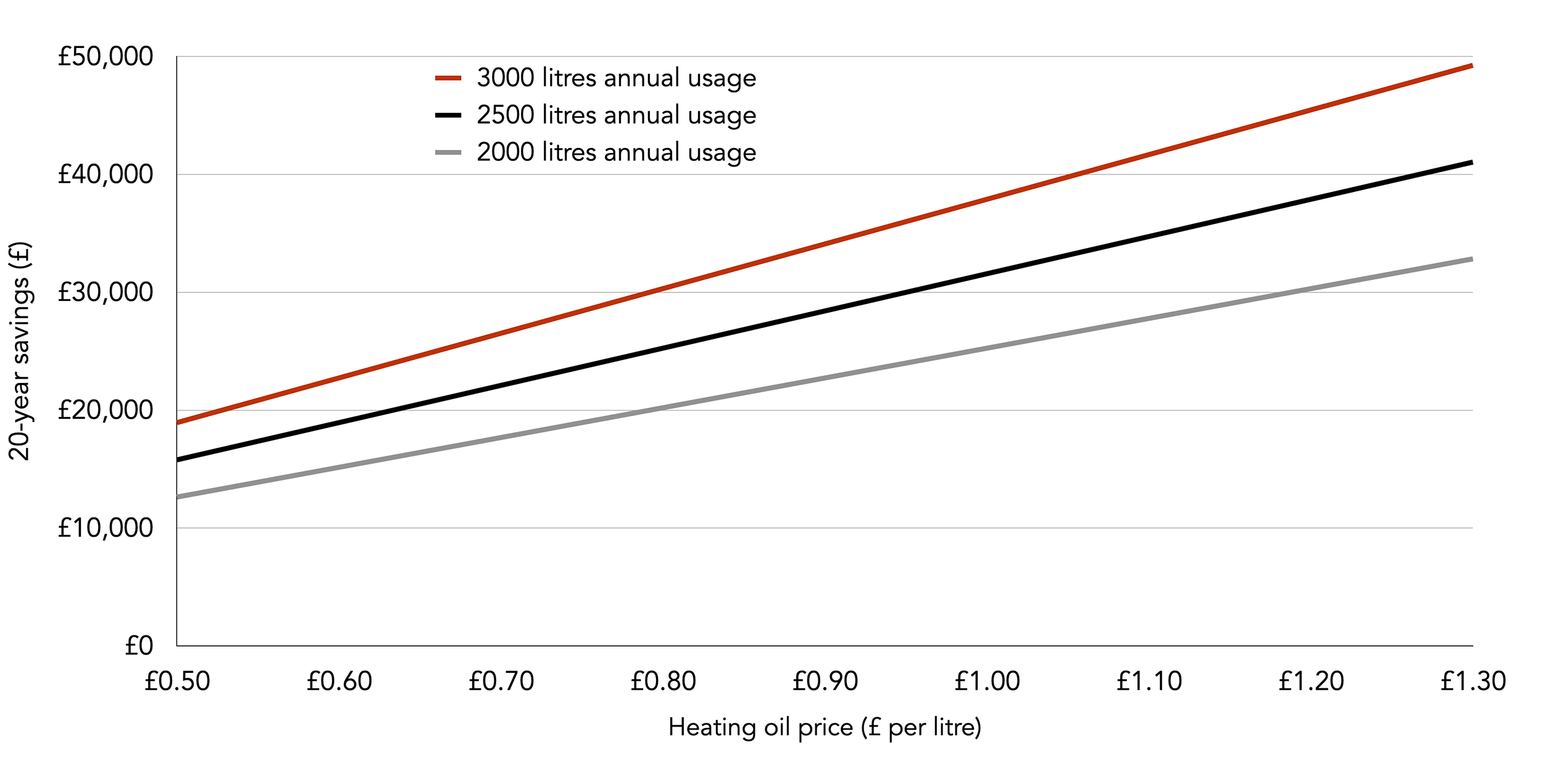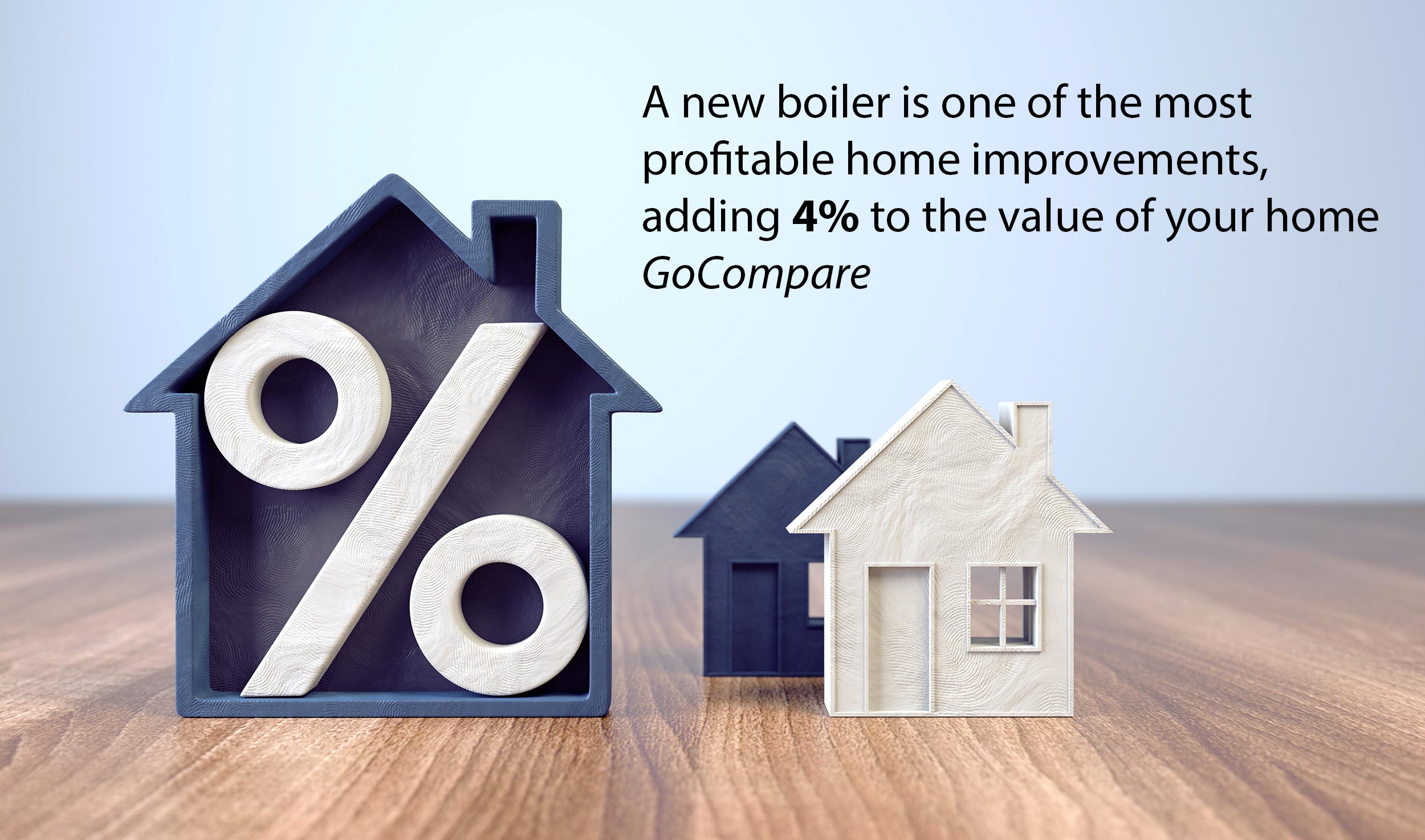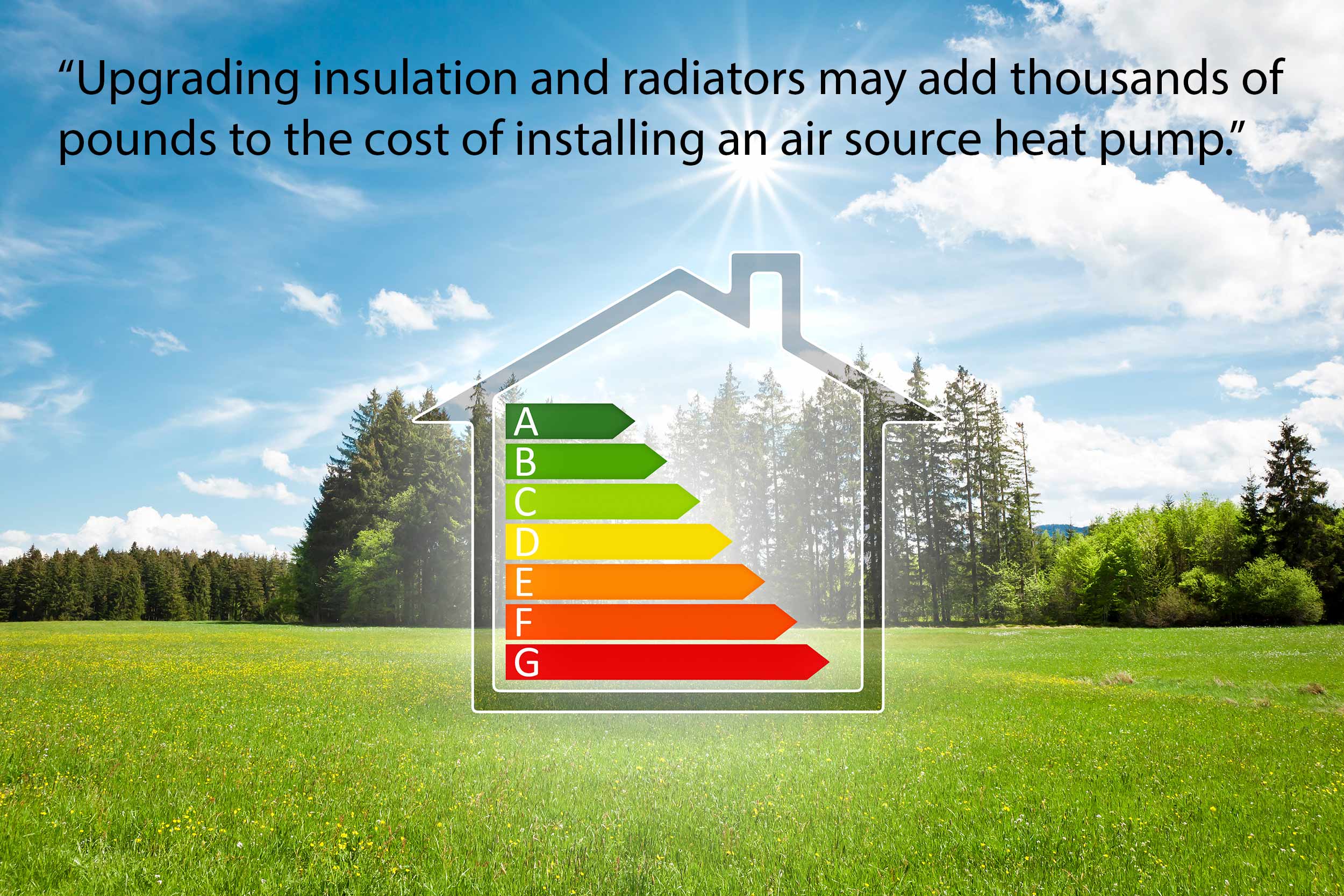 If you are looking for the best way to save money on heating, most households will achieve the most significant savings by replacing their old, inefficient oil boiler with a new, ultra-efficient model. As the price of heating oil increases, so do the savings achieved from a new boiler. With the current cost of living crisis, there’s never been a better time to upgrade an old oil boiler, with payback achieved in only months.
If you are looking for the best way to save money on heating, most households will achieve the most significant savings by replacing their old, inefficient oil boiler with a new, ultra-efficient model. As the price of heating oil increases, so do the savings achieved from a new boiler. With the current cost of living crisis, there’s never been a better time to upgrade an old oil boiler, with payback achieved in only months.
Over the 20-year lifetime of a new oil boiler, an ultra-efficient replacement could save a typical household well over £20,000. Beyond direct cost savings, installing a new boiler is one of the most profitable improvements you can make to your home, according to GoCompare, increasing its value by 4%. Ultra-efficient boilers are also much more environmentally friendly, due to the combination of lower emissions and significantly reduced oil consumption. With their huge upfront installation costs and increased running costs, air source heat pumps are not yet a viable alternative to oil heating for most households. To get a free, no-obligation quote for a replacement oil boiler, please contact us now.
Replacing your old oil-fired boiler could make a huge difference to your oil consumption and heating bills

According to the Energy Saving Trust, heating and hot water accounts for over half of what you spend in a year on energy, so an “efficient boiler makes a big difference”. Even if your existing oil boiler is reliable, it’s probably costing you a huge amount in wasted oil. That’s because over the last 25 years, there have been dramatic improvement in oil boiler efficiencies, with the introduction of condensing technology (where the boiler recovers more heat from the exhaust flue and uses it to heat the central heating water). That means far less oil needs to be burnt to keep your home warm.
In times when the oil price is high, the savings that can be made by replacing an old oil-fired boiler become even more significant. Running an ultra-efficient, modern oil-fired boiler can have a dramatic impact on your annual heating oil usage. As shown in Figure 1, below, replacing an old, 20-year-old oil-fired boiler with 60% efficiency with a modern oil-fired boiler with 95% efficiency would reduce annual oil consumption for a typical household from 2,500 litres to only 1,579 litres – a huge reduction of 921 litres. As well as the obvious saving from not having to purchase 921 litres of additional heating oil every year, lower annual oil consumption will mean that an oil tank refill will last longer and give you more flexibility on when you buy oil, for the best rates, to save even more money.

Figure 1: Relationship between annual oil consumption and oil-fired boiler efficiency [Source: Paul Braybrooke]
For many households, the payback for a replacement oil boiler will be measured in months as the savings are so substantial. As shown in Figure 2, below, which calculates the cost savings over the expected life of a replacement boiler (20 years) for different household usage levels and heating oil prices, the savings can be enormous. Over 20 years, savings of over £20,000 are easily achievable with only modest expectations for heating oil prices. Savings could be much more than this if recent oil price spikes are indicative of a longer-term trend towards significantly higher fuel and energy prices.

Figure 2: Savings over 20 years from replacing an old oil-fired boiler with 60% efficiency [Source: Paul Braybrooke]
If you are currently running an old oil-fired boiler, we believe it’s a financial ‘no brainer’ to upgrade to a modern boiler, based on oil savings alone. What makes the case for a boiler upgrade even more of a no brainer is the fact that you do not necessarily need to upgrade any other part of your heating system, such as radiators or hot water cylinder, to achieve large cost savings.
Replacing your oil-fired boiler brings other benefits too
While the financial case for upgrading an oil-fired boiler based on reduced oil consumption alone speaks for itself, there are other important benefits too. On top of the substantial savings in heating costs, a new oil boiler will significantly increase the value of your home. In addition, your heating system will be more reliable, with lower annual servicing costs. You’ll also be doing your bit for the environment, with lower emissions.

A replacement oil-fired boiler represents a great home improvement, adding significant value to your home. According to research from GoCompare home insurance, a new boiler will add significant value to your property, more than offsetting the initial outlay. According to GoCompare only around 26% of home renovations will actually add value to a property so it is important to understand where to spend your money if you are looking to improve its value. GoCompare has created its Property Investment Calculator, which can be viewed here:
Property Investment Calculator | GoCompare
According to GoCompare, installing a new boiler is one of the most profitable improvements you can make to your home, increasing its value by 4%, to generate a large profit. This is on top of the savings made in heating oil consumption. Interestingly, installing a new bathroom, fitting a new kitchen or fitting solar panels would increase house value by 1%, 2% and -2%, respectively.
A replacement oil-fired boiler will be more reliable, with lower servicing costs. If you are suffering from boiler outages, a new oil boiler will dramatically improve reliability. As oil boilers age, certain components will be subject to wear and tear, and servicing costs will inevitably increase with age. Keeping an old, inefficient oil-fired boiler going through expensive replacement and repairs is throwing good money after bad. After every outage, you are left with the knowledge that the costs of replacing expensive parts and calling out heating engineers could have been put towards a new, ultra-efficient and ultra-reliable boiler. Our replacement oil boilers come with an extensive 10-year guarantee.
A replacement oil-fired boiler has lower emissions. If you are keen to reduce your carbon footprint and NOx emissions, replacing an old, inefficient oil boiler makes a lot of sense. A 25-year-old oil boiler may only achieve an efficiency of 60-70% and generate high NOx emissions. Over the last 25 years, oil boilers have become much more efficient and legislation to substantially reduce NOx emissions of new models has been introduced. The oil boilers we install have the lowest NOx emissions and easily exceed all new legislative requirements. The sooner you replace your oil boiler, the sooner you will achieve the efficiency and emissions benefits.
Does the push towards renewable energy affect the case for upgrading an old oil-fired boiler, and would I be better replacing my old oil-fired boiler with a heat pump?

We strongly welcome the aspiration to remove the UK’s dependence on fossil fuels. However, we want to continue to deliver affordable and reliable home heating to our customers who are currently reliant on oil-fired heating. The UK Government has set out a net zero target of 2050 – reducing harmful emissions to as close to zero as possible, with the small amount of remaining emissions absorbed through natural carbon ‘sinks’ like forests. We consider that the push towards renewable energy actually enhances the case for upgrading an old, inefficient oil boiler with an ultra-efficient model. It’s all to do with realistic timescales.
As discussed above, the financial case for replacing an old, inefficient oil-fired boiler with an ultra-efficient model is compelling, with payback in a matter of months and with huge savings even in a 5 to 10 year timeframe. While alternative technologies such as air source heat pumps show potential for the longer term, they are not yet appropriate for the vast majority of households (as acknowledged by the UK Government itself). Realistically, it will take many years for affordable alternatives to oil-fired heating to be developed.
We advise extreme caution if you are considering imminently replacing your oil-fired boiler with an air source heat pump. This is because:
- The true costs for the installation of heat pumps can be extremely high and many times the cost of upgrading to a new ultra-efficient oil boiler. This is in major part because heat pumps operate at a lower temperature than oil-fired heating, so costly upgrades to radiator systems and home insulation are usually essential. Too many households are finding that, despite huge expense, their homes are under-heated and cold following a transition to heat pump technology.
- Heat pumps often significantly increase energy costs. While some new renewable heating suppliers are keen to promote their heat pump solutions with unrealistic financial cases that show substantial savings in ongoing energy costs, the reality could not be more different. Heat pumps rely on electricity to power them, and no-one will have missed the huge increase in electricity prices in April 2022, with a further substantial increase expected in October 2022. The financial case for heat pumps relies on the achievement of very high efficiencies to bring down the cost of running heat pumps to affordable levels. Unfortunately, lower outdoor temperatures and non-optimal installation (including inadequate insulation) yield much lower efficiencies than optimal values claimed by heat pump manufacturers. This means that running costs can be significantly higher than oil-fired heating using an ultra-efficient boiler.
In its recent October 2021 consultation report, the UK Government said, “Deployment of heat pumps in the UK is low compared to many similar countries. Heat pumps in the UK tend to have been installed by early adopters of green technology, and in social housing. The higher upfront and running costs compared to incumbent fossil fuel systems are currently key barriers to driving the wider deployment of heat pumps.” It said, “Air source heat pumps currently cost off gas grid households £12,000 on average to install”. This “would be around £8,000 more than a like-for-like oil system replacement”. The Government has set an ambition of “working with industry” to achieve price parity by 2030, but it remains to be seen if this is achieved.

Heat pumps only operate efficiently and effectively in energy-efficient homes. The actual cost of a heat pump can be dwarfed by the extra costs needed to upgrade home insulation and radiators. According to a recent survey of technicians by OFTEC, 87% of the properties they service are not ready for heat pumps. Poor insulation was cited as the biggest barrier, followed by the age and condition of the property and radiators needing to be replaced. According to the Department for Business, Energy and Industrial Strategy (BEIS), 65% of oil-heated homes have the lowest energy efficiency (EPC) rankings (EPC bands E, F and G). The estimated cost for upgrading Band E properties to Band C is £12,300, and £18,900 to upgrade Band F and G properties. These costs do not include the cost of the heat pump.
To help justify the huge upfront costs for the installation of a heat pump, many installers are claiming significant reductions in running costs for heat pumps compared with oil heating. However, discussions that we’ve had with early adopters of heat pump technology suggest that most have experienced increases in their energy bills. In its recent consultation, the UK Government admitted that, “For an average home off the gas grid, the annual fuel cost of running a low temperature air source heat pump could currently be higher than the cost of running an oil heating system.” With massive increases in electricity prices in April 2022 (with another substantial increase expected in October 2022), the promise of lower running costs from heat pumps seems a distant prospect. While the Government can wax lyrically about the aspiration of rebalancing energy prices to ensure heat pumps are “no more expensive” to run than conventional heating, the short-term reality is very different. Recent electricity price increases have been a ‘kick in the teeth’ for heat pump early adopters, who have already paid a huge installation price premium, with the situation set to worsen further in October 2022.
If you are looking for a 100% guaranteed way of significantly reducing your heating bills, then replace your old, inefficient oil boiler with an ultra-efficient new model at a fraction of the cost of an air source heat pump. A ‘do nothing’ strategy is the most expensive strategy of all. Households procrastinating and waiting for heat pump technology to become much cheaper may miss out on many years of substantial savings that would have been achieved from an oil boiler replacement. Given that payback can be achieved in months, purchasing a replacement oil boiler will never preclude the future purchase of an air source heat pump, when the technology is better developed and costs are much lower.
Contact us now
There’s never been a better time to upgrade your old oil-fired boiler. Seasonal Efficiencies from new models are extremely high and, with recent increases in energy prices, savings have never been higher. Upgrading your oil boiler now will provide payback within months. We will never be beaten on price. We offer flexible payment options. You can now pay by credit card (with no fees) or spread the cost of a new oil boiler with affordable pay monthly finance. Please contact us now for a no-obligation quote. We provide oil heating services to households across Cambridgeshire, Suffolk, Norfolk, Lincolnshire, Rutland, Bedfordshire and Northamptonshire.
Other pages you may be interested in:
- New and replacement oil boilers in Cambridgeshire and East Anglia
- Our replacement oil boilers are compatible with Hydrotreated Vegetable Oil (HVO) without modification to cut greenhouse gases by 90%
- Why now is the perfect time to upgrade to an oil combi boiler
- Replacing your boiler is the most profitable home improvement according to GoCompare

